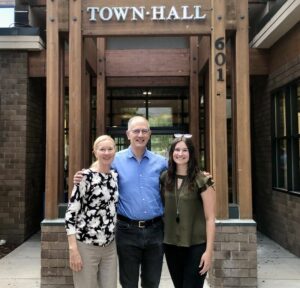Posted By Lizzie Peyton and Jerry Tinianow
It’s happening more and more. You are booking some travel online—a flight, a car or hotel reservation—and you are asked if you want to buy a “carbon credit” to offset the greenhouse gas emissions related to your travel choice.
You have a vague sense that offset credits are good. You want to do the trip, but you also want to avoid feeling guilty about how your travel contributes to climate change. The offset credit could help you avoid the guilt.
You also have a feeling of unease. Aren’t offset credits just a form of greenwashing? Are they even real? Or do they just take make you feel good, without really doing anything about climate change?
These are legitimate questions. After all, Delta Airlines is currently defending a lawsuit in federal court in California, Berrin vs. Delta Airlines Inc., asserting that Delta’s claim to be a “carbon neutral airline” was false and deceptive, because the carbon offsets it purchased to support its claims did not produce the carbon reductions needed to offset all of Delta’s emissions.
Many carbon offset credits are legitimate. They fund important projects that make genuine contributions to avoiding the worst effects of human-induced climate change. But offset credits must be approached with a bit of caution. How can you know if you are getting a reliable credit and not just buying into a scam?
The Big Sky Sustainability Network Organization (SNO) has been studying this problem and can provide some guidance. It’s paying attention to offset credits because trustworthy ones can be part of SNO’s effort to reduce the community’s net greenhouse gas emissions to zero by 2050.
A “carbon offset” is a way of confirming and quantifying an activity that reduces greenhouse gas emissions, or GHGs, or removes them from the atmosphere. The financial instrument that documents and quantifies an offset is called a “carbon credit” or “offset credit.” It confirms the amount of GHGs that will be reduced or removed by a stated activity, such as putting up wind turbines or planting trees. These credits can be bought, sold and traded. To be credible, they need to be certified by a trustworthy organization as part of a “certification regime.”
There is virtually no government regulation of certification regimes or offset credits, but there are several private organizations that have set up criteria for verifying whether certification regimes and offset credits are trustworthy. The Integrity Council for the Voluntary Carbon Market has developed ten “core principles” for assessing the integrity of individual offset programs. The council also rates categories of credits and the organizations that certify them.
There are several organizations that certify offset credits, usually applying a version of these core principles. These include Green-e, a certification program sponsored by the Center for Resource Solutions, as well as Verra and the American Carbon Registry. If you purchase a carbon offset credit that is certified by one of these organizations, you can feel confident that your money is being used to reduce GHG pollution by the amount represented in the credit. In other words, you will get what you paid for.
When you are solicited to buy an offset credit in the middle of an online travel booking, you probably won’t have time to vet whatever vendor is providing the credit. Fortunately, you don’t have to. You can buy credits on your own later. They don’t even need to be associated with travel. A trustworthy credit can be used to offset any activity that increases GHG pollution.
For individual purchases, the Green-e website provides a good starting point. Green-e does not sell credits directly from its website, but it lists a number of entities that do. A good place for businesses to search for offset credits is the Climate Trade website. It provides guidance on how to purchase offset credits and also includes a marketplace in which your business can choose from many certified vendors.
Buying trustworthy carbon offset credits can be tricky, but there are many resources available to help you locate them. Big Sky SNO has a brochure that can provide some guidance; you can request a brochure by emailing bigskysno@gmail.com.
Lizzie Peyton is the Director of Community Sustainability of Big Sky SNO. Jerry Tinianow is the proprietor of WestUrb and served as Denver’s chief sustainability officer from 2012 to 2019.


